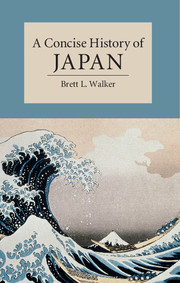Book contents
- Frontmatter
- Dedication
- Contents
- List of Illustrations
- List of Maps
- Preface
- Chronology
- Introduction
- 1 The Birth of the Yamato State, 14,500 bce – 710 ce
- 2 The Courtly Age, 710–1185
- 3 The Rise of Samurai Rule, 1185–1336
- 4 Medieval Japan and the Warring States Period, 1336–1573
- 5 Japan’s Encounter with Europe, 1543–1640
- 6 Unifying the Realm, 1560–1603
- 7 Early Modern Japan, 1600–1800
- 8 The Rise of Imperial Nationalism, 1770–1854
- 9 Meiji Enlightenment, 1868–1912
- 10 Meiji’s Discontents, 1868–1920
- 11 The Birth of Japan’s Imperial State, 1800–1910
- 12 Empire and Imperial Democracy, 1905–1931
- 13 The Pacific War, 1931–1945
- 14 Japan’s Post-War History, 1945–Present
- 15 Natural Disasters and the Edge of History
- Glossary
- Further Reading
- Index
9 - Meiji Enlightenment, 1868–1912
Published online by Cambridge University Press: 05 March 2015
- Frontmatter
- Dedication
- Contents
- List of Illustrations
- List of Maps
- Preface
- Chronology
- Introduction
- 1 The Birth of the Yamato State, 14,500 bce – 710 ce
- 2 The Courtly Age, 710–1185
- 3 The Rise of Samurai Rule, 1185–1336
- 4 Medieval Japan and the Warring States Period, 1336–1573
- 5 Japan’s Encounter with Europe, 1543–1640
- 6 Unifying the Realm, 1560–1603
- 7 Early Modern Japan, 1600–1800
- 8 The Rise of Imperial Nationalism, 1770–1854
- 9 Meiji Enlightenment, 1868–1912
- 10 Meiji’s Discontents, 1868–1920
- 11 The Birth of Japan’s Imperial State, 1800–1910
- 12 Empire and Imperial Democracy, 1905–1931
- 13 The Pacific War, 1931–1945
- 14 Japan’s Post-War History, 1945–Present
- 15 Natural Disasters and the Edge of History
- Glossary
- Further Reading
- Index
Summary
In January 1868, on the battlefields of Fushimi and Toba, the Edo bakufu succumbed to the Satchô alliance. After some 268 restive years, the losers at the Battle of Sekigahara (1600), the ‘outside’ domains that the shoguns had kept so carefully under their thumbs, finally exacted their revenge. If the architects of the Meiji Restoration had extolled the ‘expel the barbarians, revere the emperor’ doctrine in the early 1860s, however, the reality of governance – and the reality of the threat posed by the Great Powers and their crippling ‘unequal treaties’ – made such patriotic slogans untenable as actual policy. The radical imperial nationalism of the early nineteenth century surrendered to a realpolitik engagement with the US and Europe, in which modernization became the preoccupation of Japanese politics, culture, and society. Meiji reformers sought to thrust Japan into the modern age, with its constitutional governments, powerful steam engines, and twenty-four-hour electrically lit factories. With powerful policies and philosophies guiding them, Meiji reformers reinvented Japan in the late nineteenth and early twentieth centuries. They moulded Japan into a country that, less than a half century later, became a world economic and military power.
Meiji State
The new leadership of the Meiji regime was, as Ôkuma Shigenobu (1838–1922) described it, akin to the ‘myriad gods’ setting out to build a new state. The Charter Oath of April 1868 laid out the basic framework for the new regime. Although the first four tenets – ‘deliberative assemblies’, universal male suffrage, the abandonment of the ‘evil customs of the past’, and open access to entrepreneurial opportunities – proved slow to materialize, the new leadership vigorously pursued the fifth tenet, which stated that, ‘Knowledge shall be sought throughout the world so as to invigorate the foundations of imperial rule.’ This international engagement transformed Japan at every level, from cultural borrowing to armed conflict.
- Type
- Chapter
- Information
- A Concise History of Japan , pp. 159 - 178Publisher: Cambridge University PressPrint publication year: 2015



